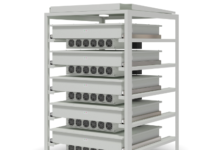
- Further evolution of the existing 3D compression structure, with significant reduction in refrigerant leakage and substantial improvement in efficiency at low loads
- Can easily replace conventional models, supporting application to a wide variety of heating and cooling products such as commercial air-conditioners and refrigeration systems
Mitsubishi Heavy Industries Thermal Systems, Ltd. (MHI Thermal Systems), a part of Mitsubishi Heavy Industries (MHI) Group, received the 51st (2023) Technology Award(1) from the Japan Society of Refrigerating and Air Conditioning Engineers (JSRAE) for its “e-3D scroll” compressor, a large-capacity, high-efficiency scroll compressor equipped with the “e-3D scroll” featuring a proprietary, advanced 3D compression structure. The award was presented in recognition of how the development of “e-3D scroll” provides a substantial improvement in efficiency while maintaining the same large capacity.
The “e-3D scroll” compressor recognized with this award is a more advanced version of the “3D scroll” compressor, the large-capacity 3D compression structure originally developed in 2005. The shape of the scroll has been changed from a stepped style used in the previous model to a smooth slope shape, further increasing the efficiency of the 3D compression structure. This change in shape significantly reduces the leakage of refrigerant from each step, considerably improving efficiency at low loads. Efficiency at a 25% load condition has been increased by 4.8%, and at 50% by 3.2%. In addition, the “e-3D scroll” compressor has sufficient versatility to allow it to easily replace existing compressors. MHI Thermal Systems’ MSV2 air-cooled heat pump chiller equipped with an “e-3D scroll” compressor offers a significantly improved IPLV(2) while maintaining the large capacity provided by “3D scroll.”
A compressor plays a key role in a heat pump outdoor unit by compressing the low-temperature, low-pressure refrigerant evaporated by absorbing heat from the air into a high-temperature, high-pressure refrigerant so that it can be easily condensed by releasing heat into the air. From the standpoint of environmental conservation to counter global warming, efforts to enhance the energy efficiency of refrigeration and air conditioning equipment are accelerating year by year, and compressors, which account for most of the power consumption in such systems and are comparable to the engine of a car, are consistently the focus of demands for greater efficiency.
MHI Group has declared its intention to achieve carbon neutrality by 2040, and is taking measures to reduce production-related CO2 emissions from its own plants and facilities, as well as reduce the CO2emissions of its customers associated with the use of MHI Group products. MHI Thermal Systems, encouraged by this award, will continue to develop technologies and products that further benefit reductions in CO2 emissions and energy conservation, and by promoting the application of “e-3D scroll” compressors in a wide variety of refrigeration and heating products, such as commercial air-conditioners and refrigeration systems, will contribute to the realization of a carbon-neutral world.
(1) From the 1st (1973) award to the 7th (1979), this prize was known as the “JAR Award,” and from the 8th (1980) award onward was divided into “academic awards,” which continues to this day. The Technology Award is presented for new technologies in the fields of refrigeration and air conditioning, as well as food freezing, cryobiology, and medicine.
(2) Integrated Part Load Value (IPLV) is the period coefficient of performance, representing the partial load efficiency of the unit throughout the year. It is calculated using the weighted factor determined for each partial load condition and load factor.
For more information, please visit www.mhi.com or follow our insights and stories on spectra.mhi.com.


















